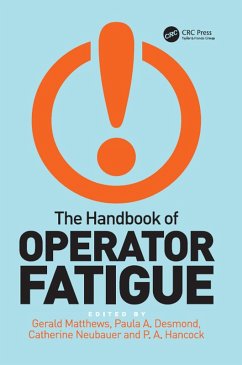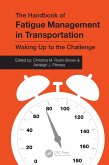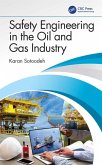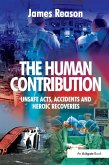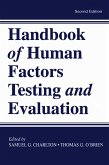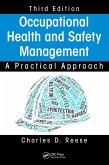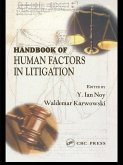Gerald Matthews, P. A. Hancock
The Handbook of Operator Fatigue (eBook, PDF)
Redaktion: Desmond, Paula A.
62,95 €
62,95 €
inkl. MwSt.
Sofort per Download lieferbar

31 °P sammeln
62,95 €
Als Download kaufen

62,95 €
inkl. MwSt.
Sofort per Download lieferbar

31 °P sammeln
Jetzt verschenken
Alle Infos zum eBook verschenken
62,95 €
inkl. MwSt.
Sofort per Download lieferbar
Alle Infos zum eBook verschenken

31 °P sammeln
Gerald Matthews, P. A. Hancock
The Handbook of Operator Fatigue (eBook, PDF)
Redaktion: Desmond, Paula A.
- Format: PDF
- Merkliste
- Auf die Merkliste
- Bewerten Bewerten
- Teilen
- Produkt teilen
- Produkterinnerung
- Produkterinnerung

Bitte loggen Sie sich zunächst in Ihr Kundenkonto ein oder registrieren Sie sich bei
bücher.de, um das eBook-Abo tolino select nutzen zu können.
Hier können Sie sich einloggen
Hier können Sie sich einloggen
Sie sind bereits eingeloggt. Klicken Sie auf 2. tolino select Abo, um fortzufahren.

Bitte loggen Sie sich zunächst in Ihr Kundenkonto ein oder registrieren Sie sich bei bücher.de, um das eBook-Abo tolino select nutzen zu können.
The Handbook of Operator Fatigue provides a comprehensive account of this subject to serve as the definitive reference work for researchers, students and practitioners alike. The volume features 30 chapters written by experts to address each important facet of fatigue, including: the scale of the fatigue problem, the nature of fatigue, how to assess fatigue, the impact of fatigue on health, fatigue in the workplace, the neurological basis of fatigue, sleep disorders, and the design of countermeasures to fatigue.
- Geräte: PC
- mit Kopierschutz
- eBook Hilfe
- Größe: 10.65MB
Andere Kunden interessierten sich auch für
![The Handbook of Fatigue Management in Transportation (eBook, PDF) The Handbook of Fatigue Management in Transportation (eBook, PDF)]() The Handbook of Fatigue Management in Transportation (eBook, PDF)83,95 €
The Handbook of Fatigue Management in Transportation (eBook, PDF)83,95 €![Microbiological Corrosion of Buildings (eBook, PDF) Microbiological Corrosion of Buildings (eBook, PDF)]() Microbiological Corrosion of Buildings (eBook, PDF)48,95 €
Microbiological Corrosion of Buildings (eBook, PDF)48,95 €![Safety Engineering in the Oil and Gas Industry (eBook, PDF) Safety Engineering in the Oil and Gas Industry (eBook, PDF)]() Karan SotoodehSafety Engineering in the Oil and Gas Industry (eBook, PDF)54,95 €
Karan SotoodehSafety Engineering in the Oil and Gas Industry (eBook, PDF)54,95 €![The Human Contribution (eBook, PDF) The Human Contribution (eBook, PDF)]() James ReasonThe Human Contribution (eBook, PDF)51,95 €
James ReasonThe Human Contribution (eBook, PDF)51,95 €![Handbook of Human Factors Testing and Evaluation (eBook, PDF) Handbook of Human Factors Testing and Evaluation (eBook, PDF)]() Handbook of Human Factors Testing and Evaluation (eBook, PDF)102,95 €
Handbook of Human Factors Testing and Evaluation (eBook, PDF)102,95 €![Occupational Health and Safety Management (eBook, PDF) Occupational Health and Safety Management (eBook, PDF)]() Charles D. ReeseOccupational Health and Safety Management (eBook, PDF)65,95 €
Charles D. ReeseOccupational Health and Safety Management (eBook, PDF)65,95 €![Handbook of Human Factors in Litigation (eBook, PDF) Handbook of Human Factors in Litigation (eBook, PDF)]() Handbook of Human Factors in Litigation (eBook, PDF)230,95 €
Handbook of Human Factors in Litigation (eBook, PDF)230,95 €-
-
-
The Handbook of Operator Fatigue provides a comprehensive account of this subject to serve as the definitive reference work for researchers, students and practitioners alike. The volume features 30 chapters written by experts to address each important facet of fatigue, including: the scale of the fatigue problem, the nature of fatigue, how to assess fatigue, the impact of fatigue on health, fatigue in the workplace, the neurological basis of fatigue, sleep disorders, and the design of countermeasures to fatigue.
Dieser Download kann aus rechtlichen Gründen nur mit Rechnungsadresse in A, B, BG, CY, CZ, D, DK, EW, E, FIN, F, GR, HR, H, IRL, I, LT, L, LR, M, NL, PL, P, R, S, SLO, SK ausgeliefert werden.
Produktdetails
- Produktdetails
- Verlag: Taylor & Francis eBooks
- Seitenzahl: 536
- Erscheinungstermin: 1. November 2017
- Englisch
- ISBN-13: 9781317029410
- Artikelnr.: 50209100
- Verlag: Taylor & Francis eBooks
- Seitenzahl: 536
- Erscheinungstermin: 1. November 2017
- Englisch
- ISBN-13: 9781317029410
- Artikelnr.: 50209100
- Herstellerkennzeichnung Die Herstellerinformationen sind derzeit nicht verfügbar.
Gerald Matthews is Professor of Psychology at the University of Cincinnati. He obtained his Ph.D. from Cambridge University in 1984, and he has previously held faculty positions at Aston University and the University of Dundee in the UK. His research focuses on human performance, cognitive models of personality, the assessment of acute states of stress and fatigue, and emotional intelligence. He has published over 150 journal articles and book chapters on these topics. He has co-authored books on Attention and Emotion: A Clinical Perspective, Personality Traits, Human Performance: Cognition, Stress and Individual Differences and Emotional Intelligence: Science and Myth. His book on Attention and Emotion won the 1998 British Psychological Society Book Award. He is also editor of Cognitive Science Perspectives on Personality and Emotion and co-editor of The Science of Emotional Intelligence. He has been elected Secretary-Treasurer of the International Society for the Study of Individual Differences, Chair of the Individual Differences in Performance Technical Group of the Human Factors and Ergonomics Society, and President-Elect of the Traffic and Transportation Division of the International Association for Applied Psychology. He has acted as a consultant for several organizations, including Procter & Gamble and the MIT Electronics Research Lab. He is also an associate editor for Personality and Individual Differences, and a consulting editor for the Journal of Experimental Psychology: Applied. Paula Desmond is a senior usability engineer at Dell, Inc. She holds degrees in Human Factors Engineering from Aston University and the University of Dundee in the UK . She has held research positions at the University of Minnesota and Texas Tech Health Sciences Center, and she has held faculty positions in Human Factors Engineering at Southwestern University and Texas Tech University. Catherine Neubauer is a Ph.D. student in the psychology department at the University of Cincinnati. She received her B.S. in psychology from the University of Central Florida in 2008 SA Peter Hancock is Provost Distinguished Research Professor in the Department of Psychology, the Institute for Simulation and Training, and the Department of Civil and Environmental Engineering at the University of Central Florida. Previously, he was the founder and Director of the Human Factors Research Laboratory at the University of Minnesota where he held appointments in the Departments of Computer Science and Electrical Engineering, Mechanical Engineering, Psychology, and Kinesiology as well as at the Cognitive Science Center and the Center on Aging Research. He currently holds as an Adjunct Senior Research Scientist at the Transportation Institute of the University of Michigan. His work has garnered over $15 million dollars in externally funded research awards and he is the author of more than 400 refereed scientific articles and publications as well as writing and editing a number of books. He has received various awards for his work, among them the Franklin V. Taylor Award of the American Psychological Association, the Liberty Mutual Prize from the International Ergonomics Association, the Jack Kraft Award of the Human Factors and Ergonomics Society and the Sir Frederic Bartlett Medal of the Ergonomics Society of Great Britain for lifetime achievement. In 2006 he was named the Norbert Wiener Award winner of the IEEE Systems, Man, and Cybernetics Society, its highest technical award. Peter is a Fellow, and past President, of the Human Factors and Ergonomics Society.
Contents: Part I Introduction to Operator Fatigue: An overview of operator fatigue
Gerald Matthews
Paula A. Desmond
Catherine Neubauer and P.A. Hancock; An historical view of operator fatigue
James C. Miller; Challenges in fatigue and performance research
Bob Hockey. Part II The Nature of Fatigue: Conceptualizing and defining fatigue
P.A. Hancock
Paula A. Desmond and Gerald Matthews; Individual differences in stress
fatigue and performance
James L. Szalma; Task characteristics and fatigue
Phillip L. Ackerman
Charles Calderwood and Erin Marie Conklin; Fatigue in sports psychology
Timothy David Noakes. Part III Assessment of Fatigue: Approaches to the measurement of fatigue
Christopher Christodoulou; Dimensional models of fatigue
Gerald Matthews
Paula A. Desmond and Edward M. Hitchcock; Models of individual differences in fatigue for performance research
Gerald Matthews
P.A. Hancock and Paula A. Desmond. Part IV The Neuroscience of Fatigue: Neuroscience of sleep and circadian rhythms
Siobhan Banks
Melinda L. Jackson and Hans P.A. Van Dongen; The influence of fatigue on brain activity
Ashley Craig and Yvonne Tran; Cerebral hemodynamic indices of operator fatigue in vigilance
Joel S. Warm
Lloyd D. Tripp
Gerald Matthews and William S. Helton; Biochemical indices of fatigue for anti-fatigue strategies and products
Yasuyoshi Watanabe
Hirohiko Kuratsune and Osami Kajimoto. Part V Performance Effects of Sleep Loss and Circadian Rhythms: Socio-emotional and neurocognitive effects of sleep loss
William D.S. Killgore; Circadian rhythms and mental performance
Jim Waterhouse; Sleep loss and performance
Valerie J. Gawron. Part VI Fatigue and Health: Differentiating fatigue in chronic fatigue syndrome and psychiatric disorders
Leonard A. Jason
Molly Brown
Meredyth Evans and Abigail Brown; Chronic fatigue syndrome
Diane L. Cox; Upper respiratory tract illnesses and fatigue
Andrew P. Smith. Part VII Applied Contexts for Operator Fatigue: Long work hours
fatigue
safety
and health
Roger R. Rosa; Fatigue and road safety: identifying crash involvement and addressing the problem within a safe systems approach
R.F. Soames Job
Andrew Graham
Chika Sakashita and Julie Hatfield; Driver fatigue and safety: a transactional perspective
Catherine Neubauer
Gerald Matthews and Dyani J. Saxby; Understanding and managing fatigue in aviation
John A. Caldwell; Soldier fatigue and performance effectiveness: yesterday
today and tomorrow
Gerald P. Kreuger. Part VIII Operational Countermeasures: Adaptive automation for mitigation of hazardous states of awareness
Chad L. Stephens
Mark W. Scerbo and Alan T. Pope; Countermeasures for driver fatigue
Ann Williamson; Work scheduling
Philip Tucker and Simon Folkard; Avoiding the impact of fatigue on human effectiveness
Jonathan French and Kelly J. Neville; Model-based fatigue risk management
Hans P.A. Van Dongen and Gregory Belenky; Index.
Gerald Matthews
Paula A. Desmond
Catherine Neubauer and P.A. Hancock; An historical view of operator fatigue
James C. Miller; Challenges in fatigue and performance research
Bob Hockey. Part II The Nature of Fatigue: Conceptualizing and defining fatigue
P.A. Hancock
Paula A. Desmond and Gerald Matthews; Individual differences in stress
fatigue and performance
James L. Szalma; Task characteristics and fatigue
Phillip L. Ackerman
Charles Calderwood and Erin Marie Conklin; Fatigue in sports psychology
Timothy David Noakes. Part III Assessment of Fatigue: Approaches to the measurement of fatigue
Christopher Christodoulou; Dimensional models of fatigue
Gerald Matthews
Paula A. Desmond and Edward M. Hitchcock; Models of individual differences in fatigue for performance research
Gerald Matthews
P.A. Hancock and Paula A. Desmond. Part IV The Neuroscience of Fatigue: Neuroscience of sleep and circadian rhythms
Siobhan Banks
Melinda L. Jackson and Hans P.A. Van Dongen; The influence of fatigue on brain activity
Ashley Craig and Yvonne Tran; Cerebral hemodynamic indices of operator fatigue in vigilance
Joel S. Warm
Lloyd D. Tripp
Gerald Matthews and William S. Helton; Biochemical indices of fatigue for anti-fatigue strategies and products
Yasuyoshi Watanabe
Hirohiko Kuratsune and Osami Kajimoto. Part V Performance Effects of Sleep Loss and Circadian Rhythms: Socio-emotional and neurocognitive effects of sleep loss
William D.S. Killgore; Circadian rhythms and mental performance
Jim Waterhouse; Sleep loss and performance
Valerie J. Gawron. Part VI Fatigue and Health: Differentiating fatigue in chronic fatigue syndrome and psychiatric disorders
Leonard A. Jason
Molly Brown
Meredyth Evans and Abigail Brown; Chronic fatigue syndrome
Diane L. Cox; Upper respiratory tract illnesses and fatigue
Andrew P. Smith. Part VII Applied Contexts for Operator Fatigue: Long work hours
fatigue
safety
and health
Roger R. Rosa; Fatigue and road safety: identifying crash involvement and addressing the problem within a safe systems approach
R.F. Soames Job
Andrew Graham
Chika Sakashita and Julie Hatfield; Driver fatigue and safety: a transactional perspective
Catherine Neubauer
Gerald Matthews and Dyani J. Saxby; Understanding and managing fatigue in aviation
John A. Caldwell; Soldier fatigue and performance effectiveness: yesterday
today and tomorrow
Gerald P. Kreuger. Part VIII Operational Countermeasures: Adaptive automation for mitigation of hazardous states of awareness
Chad L. Stephens
Mark W. Scerbo and Alan T. Pope; Countermeasures for driver fatigue
Ann Williamson; Work scheduling
Philip Tucker and Simon Folkard; Avoiding the impact of fatigue on human effectiveness
Jonathan French and Kelly J. Neville; Model-based fatigue risk management
Hans P.A. Van Dongen and Gregory Belenky; Index.
Contents: Part I Introduction to Operator Fatigue: An overview of operator fatigue
Gerald Matthews
Paula A. Desmond
Catherine Neubauer and P.A. Hancock; An historical view of operator fatigue
James C. Miller; Challenges in fatigue and performance research
Bob Hockey. Part II The Nature of Fatigue: Conceptualizing and defining fatigue
P.A. Hancock
Paula A. Desmond and Gerald Matthews; Individual differences in stress
fatigue and performance
James L. Szalma; Task characteristics and fatigue
Phillip L. Ackerman
Charles Calderwood and Erin Marie Conklin; Fatigue in sports psychology
Timothy David Noakes. Part III Assessment of Fatigue: Approaches to the measurement of fatigue
Christopher Christodoulou; Dimensional models of fatigue
Gerald Matthews
Paula A. Desmond and Edward M. Hitchcock; Models of individual differences in fatigue for performance research
Gerald Matthews
P.A. Hancock and Paula A. Desmond. Part IV The Neuroscience of Fatigue: Neuroscience of sleep and circadian rhythms
Siobhan Banks
Melinda L. Jackson and Hans P.A. Van Dongen; The influence of fatigue on brain activity
Ashley Craig and Yvonne Tran; Cerebral hemodynamic indices of operator fatigue in vigilance
Joel S. Warm
Lloyd D. Tripp
Gerald Matthews and William S. Helton; Biochemical indices of fatigue for anti-fatigue strategies and products
Yasuyoshi Watanabe
Hirohiko Kuratsune and Osami Kajimoto. Part V Performance Effects of Sleep Loss and Circadian Rhythms: Socio-emotional and neurocognitive effects of sleep loss
William D.S. Killgore; Circadian rhythms and mental performance
Jim Waterhouse; Sleep loss and performance
Valerie J. Gawron. Part VI Fatigue and Health: Differentiating fatigue in chronic fatigue syndrome and psychiatric disorders
Leonard A. Jason
Molly Brown
Meredyth Evans and Abigail Brown; Chronic fatigue syndrome
Diane L. Cox; Upper respiratory tract illnesses and fatigue
Andrew P. Smith. Part VII Applied Contexts for Operator Fatigue: Long work hours
fatigue
safety
and health
Roger R. Rosa; Fatigue and road safety: identifying crash involvement and addressing the problem within a safe systems approach
R.F. Soames Job
Andrew Graham
Chika Sakashita and Julie Hatfield; Driver fatigue and safety: a transactional perspective
Catherine Neubauer
Gerald Matthews and Dyani J. Saxby; Understanding and managing fatigue in aviation
John A. Caldwell; Soldier fatigue and performance effectiveness: yesterday
today and tomorrow
Gerald P. Kreuger. Part VIII Operational Countermeasures: Adaptive automation for mitigation of hazardous states of awareness
Chad L. Stephens
Mark W. Scerbo and Alan T. Pope; Countermeasures for driver fatigue
Ann Williamson; Work scheduling
Philip Tucker and Simon Folkard; Avoiding the impact of fatigue on human effectiveness
Jonathan French and Kelly J. Neville; Model-based fatigue risk management
Hans P.A. Van Dongen and Gregory Belenky; Index.
Gerald Matthews
Paula A. Desmond
Catherine Neubauer and P.A. Hancock; An historical view of operator fatigue
James C. Miller; Challenges in fatigue and performance research
Bob Hockey. Part II The Nature of Fatigue: Conceptualizing and defining fatigue
P.A. Hancock
Paula A. Desmond and Gerald Matthews; Individual differences in stress
fatigue and performance
James L. Szalma; Task characteristics and fatigue
Phillip L. Ackerman
Charles Calderwood and Erin Marie Conklin; Fatigue in sports psychology
Timothy David Noakes. Part III Assessment of Fatigue: Approaches to the measurement of fatigue
Christopher Christodoulou; Dimensional models of fatigue
Gerald Matthews
Paula A. Desmond and Edward M. Hitchcock; Models of individual differences in fatigue for performance research
Gerald Matthews
P.A. Hancock and Paula A. Desmond. Part IV The Neuroscience of Fatigue: Neuroscience of sleep and circadian rhythms
Siobhan Banks
Melinda L. Jackson and Hans P.A. Van Dongen; The influence of fatigue on brain activity
Ashley Craig and Yvonne Tran; Cerebral hemodynamic indices of operator fatigue in vigilance
Joel S. Warm
Lloyd D. Tripp
Gerald Matthews and William S. Helton; Biochemical indices of fatigue for anti-fatigue strategies and products
Yasuyoshi Watanabe
Hirohiko Kuratsune and Osami Kajimoto. Part V Performance Effects of Sleep Loss and Circadian Rhythms: Socio-emotional and neurocognitive effects of sleep loss
William D.S. Killgore; Circadian rhythms and mental performance
Jim Waterhouse; Sleep loss and performance
Valerie J. Gawron. Part VI Fatigue and Health: Differentiating fatigue in chronic fatigue syndrome and psychiatric disorders
Leonard A. Jason
Molly Brown
Meredyth Evans and Abigail Brown; Chronic fatigue syndrome
Diane L. Cox; Upper respiratory tract illnesses and fatigue
Andrew P. Smith. Part VII Applied Contexts for Operator Fatigue: Long work hours
fatigue
safety
and health
Roger R. Rosa; Fatigue and road safety: identifying crash involvement and addressing the problem within a safe systems approach
R.F. Soames Job
Andrew Graham
Chika Sakashita and Julie Hatfield; Driver fatigue and safety: a transactional perspective
Catherine Neubauer
Gerald Matthews and Dyani J. Saxby; Understanding and managing fatigue in aviation
John A. Caldwell; Soldier fatigue and performance effectiveness: yesterday
today and tomorrow
Gerald P. Kreuger. Part VIII Operational Countermeasures: Adaptive automation for mitigation of hazardous states of awareness
Chad L. Stephens
Mark W. Scerbo and Alan T. Pope; Countermeasures for driver fatigue
Ann Williamson; Work scheduling
Philip Tucker and Simon Folkard; Avoiding the impact of fatigue on human effectiveness
Jonathan French and Kelly J. Neville; Model-based fatigue risk management
Hans P.A. Van Dongen and Gregory Belenky; Index.
